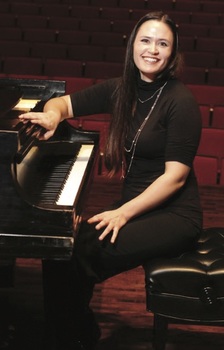|
"Music is about communication, about telling stories," says the pianist Dr. Tamara McCoy. Here is some of her story, which might be heard in her music.
Tamara was born and raised in Alaska. Her great-grandparents on her mother’s side were first generation Americans, who came from Norway. Her father’s parents were born and raised in Northern Mexico and he was raised in Los Angeles. Tamara’s father arrived in Alaska in his mid-twenties as a Dominican monk. He was part of a folk music group at Holy Family Cathedral when he met her mom, who sang in that same group. They fell in love, so he asked the Church to be released from the orders that forbade him to marry and to keep money. Named Mary and Joseph, they were probably fated to become a couple. Tamara is the eldest of three siblings, all of whom have played music. She recalls, “We were all in a family folk group. We all sang in a band called Bustamante Bluegrass.” Her dad does not read music, but he sings beautifully, and he plays the guitar and banjo by ear. Her mother, now a music teacher with the Anchorage School District, was music director and choir director for the catholic church in Fort Richardson. Tamara remembers, “As kids we all grew up playing one instrument or another; my family life was absorbed in music.” Her mother received a degree in voice and music education during Tamara’s childhood and she accompanied her to classes at University of Alaska, Anchorage. Therefore, Mary’s teachers became Tamara’s first teachers. As a child she knew that playing this sound was exactly what she wanted to do for living, and she decided to be a musician when she was five years old. On her fifth birthday her mother asked her, “Do you want to take piano lessons?” Since that very moment, she devoted her life to the instrument. Her only goal was to become a teacher. She did not consider any other career path, and she never thought she would be a concert artist. She always enjoyed recitals and competitions, not realizing as a child that what she was doing then would become a career. She realized this only when she was almost ready to go to college, and the French piano teacher with whom she was studying started pushing her to win in the competitions. Tamara had never thought of winning before. It was the teacher who persuaded her parents to keep her in high school an extra year, rather than letting her graduate early, so she could participate in an important competition. He pushed her so hard that Tamara learned stage fright. “The feeling was like the world was going to swallow me,” she said. “When you do something for love, but suddenly it switches and it is not love anymore, but your livelihood, or how people are going to label you, then that thing becomes you. It is not you as a person that matters anymore, and it is sad.” To overcome that, Tamara adds: “You just have to decide.” She overcame that fear in a competition at the University of Kentucky. All the different instruments were competing against each other, she had two weeks to get ready for it, but she rehearsed a great deal. When she arrived at the competition the day before it opened, she thought to herself: “I’m going to go there, and show them what I can do. I’m not going to go there with competition in my heart. I’ll just do it for me, because this is the last chance I have to be in this competition.” When the contest was over Tamara waited offstage, expecting to simply drive home. She recalls feeling annoyed by a violinist and a violist who also wandered around in the wings, exuding an air of superiority that she disliked. For the first place winner of the competition, a tie was announced between a musician who had played a clarinet concerto wonderfully and Tamara. “I was so distracted when they said my name that I didn’t even realize they were calling me, until everybody started looking at me, and I asked aloud ‘whaaat?’ That was the first time that I knew how it felt to win something without having the idea of winning in mind. Having fun and engaging with the music might be key.” Music, Tamara says, “is about communication, about saying to the other people: ‘I have this piece and I really want to show it to you’.” She has felt it playing solo, but also as a collaborative artist. Recently she received a grant from the Rasmuson Foundation for a duo project with classical guitarist Valerie Hartzell. As a collaborative artist, “music feels like communication tenfold. I can achieve far more than what I can do by myself.” This does not mean that she wants to be an accompanist. She is often an accompanist, but “that’s different,” she says. Tamara teaches Piano, Voice, and World Music at Alaska Pacific University and teaches at her own voice and piano studio, McCoy Piano & Voice Studio. Tamara is the Music Director at the Anchorage Unitarian Universalist Fellowship and the Traditional and Choir Director at Anchorage Lutheran Church, which she understands also as building a relationship with music as a source of communication. “Music is 100 percent about telling stories, is nothing but someone telling stories about how were they feeling, or what they were trying to say, or even a literal plot. So I consider myself a storyteller, a positive storyteller.” For information about Tamara McCoy’s upcoming presentations, visit: http://mccoypianostudio.yolasite.com |
|
